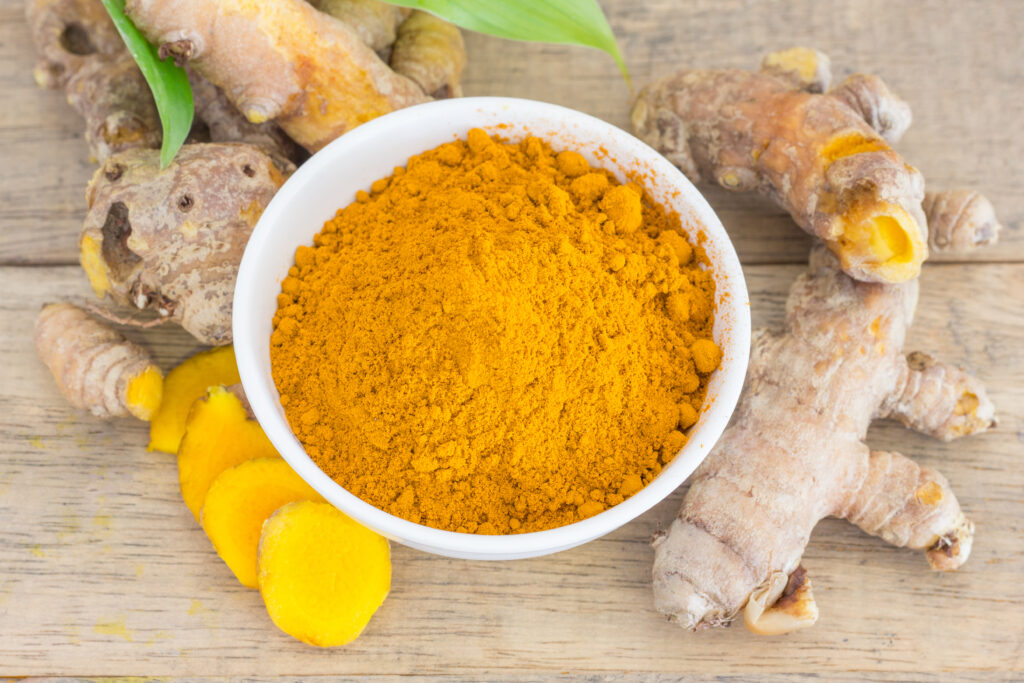- Home
- Health Center
- Health Info
- The “Golden Spice” for “Golden Joints”
How to Choose
The “Golden Spice” for “Golden Joints”


Origin of Turmeric
Turmeric, also known as Curcuma longa or “Indian Saffron”, is a plant from the ginger family that is native to Southeast Asia.1
Turmeric contains curcumin, the major bioactive ingredient that has powerful antioxidant, antimicrobial, anti-inflammatory effects.2 Turmeric is a well-known herb used during ancient times in Ayurvedic and Traditional Chinese medicine for various health benefits.1 This includes inflammatory conditions, pain management, wound healing, regulation of bad and good cholesterol, diabetes, cancer prevention, improving digestion, skin and liver conditions.3 Turmeric is great for people who are active in sports because it can also aid in exercise-induced inflammation and muscle soreness by fastening recovery period.4
Role of Turmeric in Joint Pain
Inflammation is an important bodily reaction because it activates your body’s immune response that will fight off foreign invaders and stimulate cell repair. Without inflammation, the body is exposed to harm from foreign invaders such as bacteria, viruses, allergens etc.5
Short-term inflammation (acute) is beneficial, but it will become a problem if it turns into long-term inflammation (chronic) where the body’s immune cells attack their own healthy cells involuntarily. Chronic, low-level inflammation is the main cause of most chronic conditions such as inflamed joints, dementia, eczema, and other degenerative conditions.4 By suppressing chronic inflammation, it can help in preventing and managing these conditions.
What happens in chronic joint pain is that oxidative stress causes inflammation which leads to the breakdown of cartilage in the joints. In this case, curcumin can inhibit the this process with its antiinflammatory properties. By doing so, it relieves joint pain and also improves joint function.4
Difference between Food Grade and Pharmaceutical Turmeric
Turmeric powder is also known as the “Golden Spice” because it is a bright yellow aromatic spice that comes from grinding of the rhizome root of the plant. It is used in colouring and flavouring in Asian cooking like curries as well as in dyes.1 It is also available commercially in many products in the form of capsules, teas, powders, and extracts.
The amount of curcumin in turmeric powder is only about 3% by weight.6 It would be very hard to reach the optimum level just by adding turmeric spice to your food. On the other hand, the concentration of curcumin in turmeric extract is increased to as high as 95%. Therefore, if you want to experience the desired effect, taking supplements that contain significant amounts of curcumin is the best option.7
Effectiveness as a Supplement
Curcumin is strongly anti-inflammatory. In fact, it’s so powerful that it is as effective as some anti-inflammatory drugs, just that without any harmful side effects.
The usual adult daily dose for turmeric may be from 500 mg to 2000 mg of curcumin.6 Based on a study done by Gianni Belcaro and his team, the result show that participants with osteoarthritic joint pain are greatly reduced when they were taking 500 mg of turmeric extract two times daily for 2 to 3 months.4
Side Effects & Interactions
Turmeric is generally safe when taken moderately. However, side effects and interactions with other medicines or herbs do occur such as skin irritations when applied topically. Besides that, curcumin is shown to increase the level of certain medicines in the body like statins, which may precipitate its side effects such as muscleaches.9
Turmeric also may cause gastric side effects such as nausea or diarrhoea because it irritate the stomach walls.6 It may also increase the risk of ulcer formation and acid reflux because it increases production of stomach acid.3 That is why taking turmeric with painkillers (eg: ibuprofen) may worsen gastric side effects. Gastric side effects can be reduced by taking it during meal time.2
People with certain conditions should exercise caution when taking turmeric products. Turmeric is known to increase the risk of bleeding by slowing down blood clotting. Therefore it is not recommended to be taken by people with bleeding disorders, pregnant mothers or those on blood thinners such as warfarin. In fact, turmeric products should be stopped for at least 2 weeks before any surgery.8 Herbs such as ginkgo biloba, garlic, ginseng which are well-known to have blood thinning properties obviously should not be taken with turmeric.8 Turmeric may also precipitate uterine contractions, so it is not to be taken by pregnant mothers.3
Curcumin is known for reducing blood sugar level and also preventing diabetes-related complications.10 That’s why turmeric supplements are encouraged to be taken by diabetics to help manage it. However, because of this property, it may interact with certain antidiabetic medicines (eg: gliclazide) leading to doubling the effect of lowering blood sugar level.9 For those that are on antidiabetics, it’s advised to check sugar levels daily when newly starting on turmeric supplements. If in doubt, it’s always best to consult your doctor before taking any turmeric products.
References
- Turmeric. National Centre for Complementary and Integrative Health (NCCIH). (Web accessed June 2020). Web link: https://www.nccih.nih.gov/health/turmeric
- 10 Proven Health Benefits of Turmeric and Curcumin. Kris Gunnars. Healthline. (Web accessed June 2020). Web link: https://www.healthline.com/nutrition/top-10-evidence-based-health-benefits-of-turmeric#section1
- Everything You Need to Know About Turmeric. Megan Ware. MedicalNewsToday. (Web accessed June 2020). Web link: https://www.medicalnewstoday.com/articles/306981
- Curcumin: A Review of Its Effects on Human Health. S. J. Hewlings and D. S. Kalman (2017). Multidisciplinary Digital Publishing Institute.
- Curcumin: An Inflammasome Silencer. S. Hasanzadeh, M.I. Read, A.R. Bland et.al (2020). ScienceDirect.
- Turmeric Dosage: How Much Should You Take Per Day? Makayla Meixner. Healthline. (Web accessed June 2020). Web link: https://www.healthline.com/nutrition/turmeric-dosage#dosage
- Turmeric Spice VS Turmeric Supplements. Tod Cooperman. ConsumerLab.com. (Web accessed June 2020). Web link: https://www.consumerlab.com/answers/how-does-turmeric-spice-differ-from-turmeric-curcumin-supplements/tumeric_spice_vs_supplements/
- Turmeric (Curcumin). WebMD. (Web accessed June 2020). Web link: https://www.webmd.com/diet/supplement-guide-turmeric#1
- Turmeric: Potential Adverse Effects and Interactions. J. Girvin (2018). University Hospital of Wales.
- Curcumin and Diabetes: A Systematic Review. D.W Zhang, M. Fu, S.H. Gao, and J.L.Liu (2013). Hindawi Publishing Corporation.
Latest Health Info
Get Vaccinated, Stay Protected! 💉
What is Vaccination? Vaccination is a way to protect your body from getting sick by teaching your immune system how ...
What You Should Know About HMPV
As of January 2025, reports have emerged of an outbreak of Human Metapneumovirus (HMPV) in China. HMPV is a virus ...
Flu Vaccines: Should we go North or South?
Flu shots are very much like seasonal fashion trends—every year, they get updated to match what’s “in” (or in this ...



